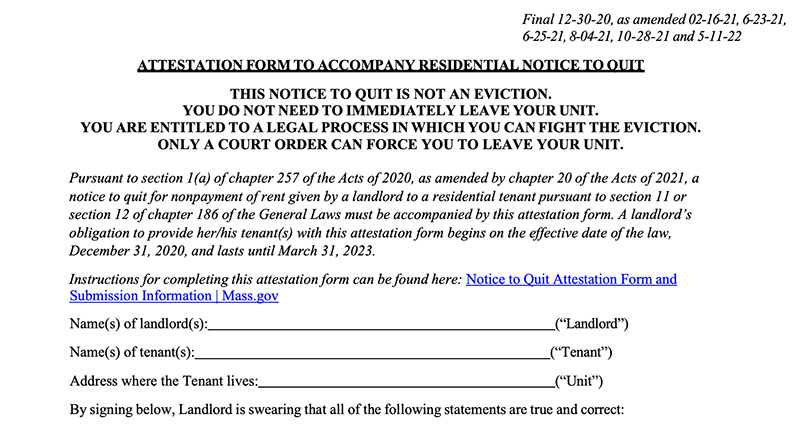State Legislature Makes Tenants Rights Sheet Permanent Requirement for Issuing Notice to Quit, Temporarily Extends Copies and Continuances
| . Posted in News - 2 Comments
By Kimberly Rau, MassLandlords, Inc.
A pandemic measure that required landlords to notify their tenants of their rights when issuing a notice to quit for nonpayment of rent has been made a permanent part of Chapter 186 of the Massachusetts General Laws as a result of Chapter 107 of the Acts of 2022, which was posted effective July 16, 2022.

A screenshot of the state-mandated attestation form that must accompany a notice to quit, advising tenants that they may be eligible for eviction protections under the law, and directing them to the appropriate resources.
Lic: CC by SA 4.0 MassLandlords Inc.
This law requires landlords who are starting the eviction process for nonpayment to include a form notifying their tenants of their rights and resources during an eviction. This form includes information on rental assistance programs they may be eligible for, any standing rules or emergency orders that may impact the eviction process, and any relevant federal or state restrictions on residential evictions that may be in effect at the time of notice. The landlord must also include documentation of any agreements between landlord and tenant regarding repayment of owed rent.
The form must also “prominently display” a statement that reads: “THIS NOTICE TO QUIT IS NOT AN EVICTION. YOU DO NOT NEED TO IMMEDIATELY LEAVE YOUR UNIT. YOU ARE ENTITLED TO A LEGAL PROCEEDING IN WHICH YOU CAN DEFEND AGAINST THE EVICTION. ONLY A COURT ORDER CAN FORCE YOU TO LEAVE YOUR UNIT.”
The form is be available from the executive office of housing and economic development (EOHED), and is available in English as well as translated into the five most commonly spoken languages in the state.
As has been the case since the requirement was introduced in 2020, courts have been instructed to not accept any writ, summons or complaint that concerns eviction for nonpayment of rent without proof that this form was delivered to the tenant.
During the pandemic, the state also required that landlords notify them that their tenants had been given the form. This requirement will remain in effect until March 31, 2023, at which point the state will not require notification that the form was delivered (the courts will still require proof). After that date, the state will only be responsible for developing the form.
Our notice to quit forms continue to reflect this change.
Evictions Remain Paused While Rental Assistance is Pending
Chapter 257 of the Acts of 2020 paused evictions while rental assistance was pending. If you were evicting a tenant for nonpayment of rent, but the renter had applied for rental assistance, the eviction was paused until rental assistance was approved or denied.
This law was extended through March 31, 2023, by Chapter 42 of the Acts of 2022.
FAQ: If Evictions are Paused, is That an Eviction Moratorium?
Some landlords suggest that the extension of the law that pauses evictions while rental assistance applications are pending is just another extension of the state eviction moratorium. It can certainly seem that way, particularly if rental assistance applications are processed slowly (or “time out” without response) or if rental assistance is not widely available.
However, a pause on evictions while assistance is pending is not the same as an eviction moratorium. It’s a continuance. If your renter gets rental assistance, then you get your back rent. If your renter does not, you can proceed with the eviction. Also, you can bring an objection before the court if you know your tenant has not actually applied for assistance or you know your tenant will not be receiving assistance. Courts can restart a case, and have done so in the past.
However, the past two years have shown us that rental assistance can be a very slow process. MassLandlords is in the process of suing the state over records surrounding rental assistance applications that “timed out” or were otherwise denied. And we’ve learned that the courts are not necessarily the best avenue for recovering possession of your unit except in dire situations. We recommend that you consider a “cash for keys” offer if you can manage it.
These are not perfect scenarios, and they’re certainly concerning. However, given the resources available to us presently, we feel they reflect the best practices landlords can embrace right now.




